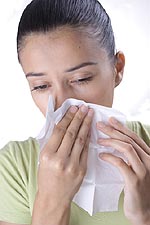| Home A B C D E F G H I J K L M N O P Q R S T U V W X Y Z |
|
Home |
Allergies: Symptoms, Causes, Diagnosis
|
|||

Allergies can be described as an altered reaction; it is an inappropriate and harmful response of the body's defense mechanism to substances that are normally harmless.
Symptoms of Allergies Include:
Conditions such as asthma are common, in which allergy plays a major role. In some people, severe allergies to environmental or dietary allergens, or to medication, occur that may result in life-threatening anaphylactic reactions and potentially death.
What Causes Allergies?
Allergies are genetic and two factors determine whether you will develop an allergic disease. The first is your genetic make-up and the second your exposure to an allergen.
Allergens commonly act as allergy triggers in susceptible individuals. The following are the most common allergens. Some people are allergic to several of these:
Diagnosis
A variety of different tests are available. These can detect whether symptoms are due to an allergy and can also detect the allergens responsible.
Skin Prick Test: Skin is used as a test site to stimulate what happens in other parts of the body during an allergic reaction. The test introduces a tiny amount of allergen into the skin. It is quite safe and can be carried out on most age groups. With this test, 20-30 allergens can be simultaneously tested.
Skin Patch Test: This test is used to detect a skin allergy called contact dermatitis. Common allergens include nickel, cosmetics and preservatives. The allergen solution is placed on a pad that is then kept in contact with the skin for up to 2 days.
Blood Tests: Blood tests can accurately measure the precise amounts of allergy anti-bodies present in blood. It is particularly useful if the patient uses antihistamines to control allergies, as these block skin test reactions.
Treatment
The most important and effective way to overcome allergies is to identify what causes the allergy and to avoid these allergens.
There are, however, a wide variety of medicines available to reduce and control symptoms.
Decongestions: Nasal drops or sprays act by constricting blood vessels supplying the lining of the nose. This causes shrinking of nasal tissue and relief of nasal obstruction. The drugs are very effective and work very rapidly. They should not be used for long periods because shutting off the blood supply for too long can cause tissue damage, worsening symptoms.
Bronchodilators: Inhalers are used to smooth bronchial muscle, allowing air to move freely through the airways. It is very effective for people who get occasional attacks of wheezing after contact with allergens. It is not effective treatment for severe or acute asthma.
Emollients: Ointment or cream used to soothe and moisturize patches of inflamed skin. Emollients contain preservatives to which some people may be allergic.
Antihistamines: Tablets or syrup that block the inflammatory effects of histamine. Antihistamines are effective in the treatment of itching and sneezing.
Corticosteroids: Powerful drugs used to relieve inflammation in air passages or on skin. Various forms are available: inhalers, cream or ointment. Corticosteroids are very effective, but have side effects such as acne, facial rending and muscle weakness, which almost always follow when you take the drugs in tablet form.
ALSO ON THIS WEBSITE: Homeopathy Offers Allergy Relief with No Side Effects |
|
Glossary References Links Contact
|